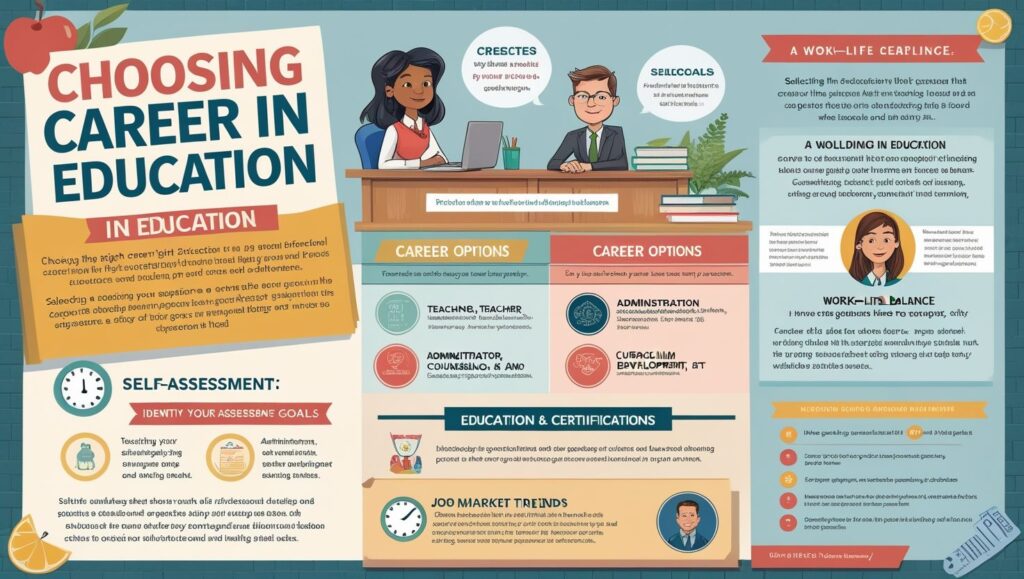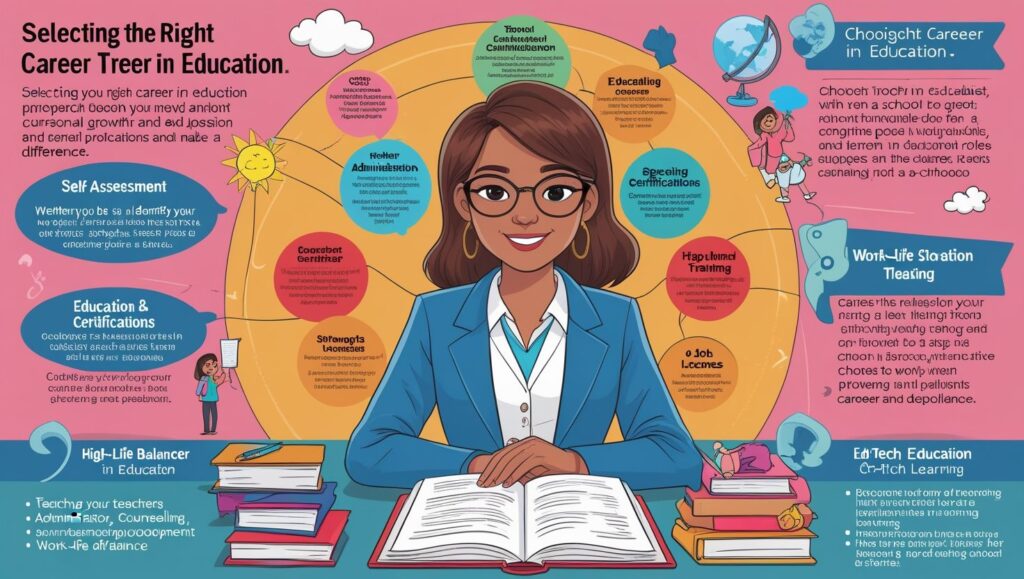Introduction
Choosing the Right Career in Education, Selecting the right career in education is a crucial decision that shapes not only your professional life but also your personal fulfillment. The field of education offers diverse opportunities, from teaching and administration to counseling and curriculum development. However, choosing the right path requires careful consideration of your skills, interests, and long-term goals.
This article explores key factors to consider when selecting a career in education, different career options available, and steps to make an informed decision.
1. Understanding Your Interests and Strengths
Before choosing a career in education, it is essential to evaluate your interests, strengths, and personality traits.
A. Self-Assessment
Ask yourself:
- Do I enjoy working with children, teenagers, or adults?
- Am I more inclined toward teaching, administration, or research?
- Do I have strong communication and leadership skills?
B. Personality Traits
Certain careers in education align with specific personality types:
- Teaching: Requires patience, creativity, and adaptability.
- Educational Administration: Needs leadership, decision-making, and organizational skills.
- Counseling: Demands empathy, active listening, and problem-solving abilities.
Taking career assessment tests (such as the Myers-Briggs Type Indicator or Holland Code) can help identify suitable roles.

2. Exploring Career Options in Education
The education sector offers a wide range of career paths. Below are some prominent options:
A. Teaching Careers
- Early Childhood Education
- Working with children (ages 0-8) in preschools or kindergartens.
- Requires a degree in early childhood education and certifications.
- Primary and Secondary School Teaching
- Teaching specific subjects (Math, Science, English, etc.) in K-12 schools.
- Requires a bachelor’s degree in education and state licensure.
- Special Education
- Supporting students with disabilities.
- Needs specialized training and certification.
- Higher Education (College/University Professor)
- Teaching undergraduate or postgraduate students.
- Requires a master’s or Ph.D. in the chosen field.
B. Administrative Roles
- School Principal/Assistant Principal
- Overseeing school operations, staff, and student performance.
- Requires a master’s degree in educational leadership and experience in teaching.
- Education Consultant
- Advising schools on curriculum, policies, and teaching strategies.
- Needs expertise in education and often a master’s degree.
- Curriculum Developer
- Designing educational programs and materials.
- Requires knowledge of pedagogy and subject matter expertise.
C. Support and Counseling Roles
- School Counselor
- Assisting students with academic and emotional challenges.
- Requires a master’s degree in school counseling and certification.
- Educational Psychologist
- Studying learning processes and helping students with learning difficulties.
- Needs a degree in psychology and specialized training.
D. Alternative Education Careers
- Corporate Trainer
- Providing professional development in businesses.
- Requires expertise in a specific industry and training skills.
- Online Educator/E-Learning Specialist
- Teaching through digital platforms or designing online courses.
- Needs tech-savviness and teaching experience.
- Nonprofit Education Roles
- Working with NGOs to promote literacy and education in underserved communities.
3. Educational Qualifications and Certifications
Different roles in education require varying levels of education and certifications:
- Bachelor’s Degree: Required for K-12 teaching (with licensure).
- Master’s Degree: Needed for administrative roles, counseling, and higher education.
- Ph.D. or Ed.D.: Essential for university professors and high-level research positions.
- Certifications: Teaching licenses, school counseling certifications, and specialized training (e.g., special education).
4. Job Market and Career Growth
A. Demand for Educators
- High Demand Areas: Special education, STEM (Science, Technology, Engineering, Math), and bilingual education.
- Growing Fields: Online education, educational technology (EdTech), and corporate training.
B. Salary Expectations
Salaries vary based on role, experience, and location:
- Teachers: 40,000–40,000–70,000 (varies by state and level).
- School Administrators: 80,000–80,000–120,000.
- University Professors: 60,000–60,000–150,000 (depending on rank and institution).
C. Career Advancement
- Teachers can become department heads, principals, or district administrators.
- Professors can advance to deans or academic researchers.
- Corporate trainers can move into leadership roles in HR or consulting.
5. Work-Life Balance and Job Satisfaction
A career in education can be rewarding but also demanding:
A. Pros:
- Making a positive impact on students’ lives.
- Job stability (especially in public schools).
- Summers and holidays off (for teachers).
B. Challenges:
- High stress (classroom management, grading, administrative duties).
- Moderate salaries compared to corporate jobs.
- Heavy workload (lesson planning, parent meetings).

6. Steps to Choosing the Right Career in Education
1: Research Different Roles
- Explore job descriptions, qualifications, and salary ranges.
- Talk to professionals in the field.
2: Gain Experience
- Volunteer at schools or education-related organizations.
- Work as a substitute teacher or teaching assistant.
3: Pursue Relevant Education
- Enroll in degree programs aligned with your career choice.
- Obtain necessary certifications.
4: Network with Professionals
- Join education associations (e.g., National Education Association).
- Attend conferences and workshops.
5: Evaluate Long-Term Goals
- Consider work-life balance, income potential, and job satisfaction.
- Assess opportunities for growth and specialization.
Conclusion
Choosing the right career in education requires self-reflection, research, and planning. Whether you aspire to be a teacher, administrator, counselor, or education technology specialist, aligning your skills and passions with the right role will lead to a fulfilling career. By understanding the qualifications, job market trends, and personal preferences, you can make an informed decision that benefits both your professional growth and the lives of learners.
The field of education is ever-evolving, offering numerous opportunities for those who are passionate about shaping minds and contributing to society. Take the time to explore your options, gain experience, and embark on a rewarding journey in education.

6 thoughts on “Choosing the Right Career in Education”
Comments are closed.